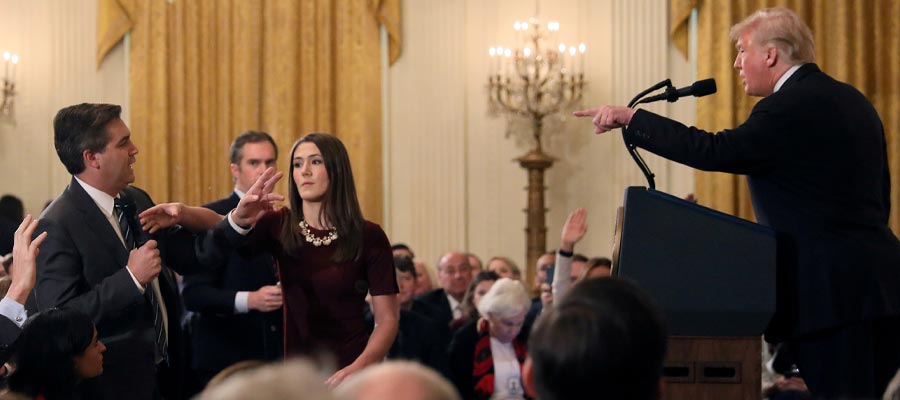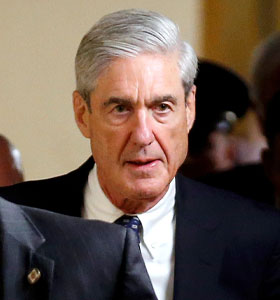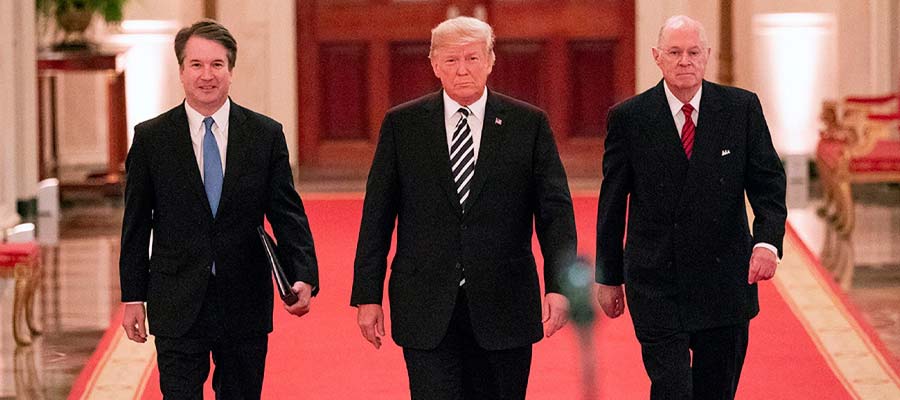Jennifer Rubin interview - IBA Annual Conference 2018

She was an employment lawyer for Hollywood studios for 20 years and became a columnist for The Washington Post in 2010. Here, Jennifer Rubin expresses her views from what’s described as a right-of-centre perspective. She speaks with James Lewis, the IBA’s Director of Content, directly after Judge Brett Kavanaugh’s controversial confirmation to the Supreme Court, just weeks before the US mid-term elections.
Watch full filmed interview here
James Lewis: The tagline of The Washington Post, your paper, is ‘Democracy Dies in Darkness’. So how dark is it in America at the moment?
Jennifer Rubin: It’s a little shadier than it used to be. America is going through a traumatic time but it’s not unique to America. We’re going through a worldwide crisis in which anti-democratic – small ‘d’ – figures are really challenging some of our deeply held traditions, norms and values. We’ve gone through a bit of a trauma over the past couple of years in the United States in which many understandings that we thought were taken for granted by both major political parties are now under attack. So I think it is a time of challenge for all institutions: the courts, lawyers, the free press, but also for the American people. The question is, how much do they really value their democracy and our constitutional system of government?
JL: The President referring repeatedly to fake news and the media as ‘enemies of the people’ is something to be seriously concerned about, isn’t it?
JR: Absolutely. It’s a Stalinist phrase, ‘the enemy of the people’, and it’s used for a specific purpose: to discredit objective, alternate sources of truth and information. When you are desirous of taking as much power as possible, one of the ways you do that is to try to monopolise the truth, to try to bend reality to your own political ends. In order to do that you have to discredit other sources of information. We’ve not only seen President Trump attack the press, we’ve seen the administration attacking other objective sources of information, whether it’s academia or scientific information. This is a telltale sign of a deterioration in democratic norms and principles.
Traditionally, the executive branch and the White House do not meddle in the individual investigations and enforcement actions of the Department of Justice…That’s a sign of corruption
JL: What are you and your colleagues doing about that?
JR: Well, as our editor Marty Baron says, we are doing our jobs. The best the press can do is to vigorously pursue, as much as we are able, the truth. We believe that there are objective facts that the American people should hear and we present them. We do not see our role as the opponents of the administration. We have a very specific obligation, in fact the press is the only private entity that is actually mentioned in our founding documents, and we take that very seriously. We are there to inform and to expose whatever the administration is doing, whether that’s good, bad or indifferent. Our role is essential for an informed citizenry. Unfortunately, the press has come under a lot of attack, not only from President Trump but from other sources. It’s our job to instil credibility, to earn the trust of the American people, and to use it in the ways that it was intended, to shine a light and to...
JL: ...speak truth to power. It’s never been more important, has it?
JR: Speak truth to power. Absolutely.

A White House staff member reaches for the microphone held by CNN’s Jim Acosta as he questions US President Donald Trump during a news conference following the US mid-term congressional elections. Washington, US, 7 November 2018. REUTERS/Jonathan Ernst
JL: The Trump administration is two years in. It has been somewhat chaotic, to put it mildly. There are dramatic events pretty much every day. I’m just wondering if you’re able to do a review of the past two years and pick out anything that has been particularly shocking, or one thing that you think is more significant than anything else?
JR: I think what has been the most distressing and most noteworthy issue is the degree to which Congress has failed to live up to its constitutional obligations to be a co-equal branch of government and to check the administration. We’ve had good, bad, indifferent presidents; we’ve had corrupt presidents; we’ve had presidents who are very much devoted to clean government. But throughout, we at least had the assurance that in the genius of the Founding Fathers was a system of separation of powers and of checks and balances: that if the administration has excesses, Congress has oversight responsibility; that if a constitutional officer behaves in ways that are inimical to his oath of office, there is a process of impeachment; that Congress really does play an instrumental role in our democratic institutions despite the executive branch in the American system having become much more powerful than it was ever envisioned to be.
Instead, what we’ve seen is that Congress now plays a partisan, tribalistic role in supporting and enabling the President, rather than checking, moderating, investigating and holding him responsible for his actions. Two very simple examples: one is that because he has chosen, unlike any other president, to retain all of his business functions – he still owns them although nominally his sons run them – there’s a real question as to whether he is unconstitutionally receiving foreign monies. In the words of the Constitution, you’re not permitted to receive things of value – ‘foreign emoluments’ – from foreign states. Our Founders thought that was a really bad way to lose our independence.
JL: Sounds sensible to me. It’s a fundamental sovereignty issue.
JR: Congress has not had a single hearing, let alone taken any action in that regard. Now individual Democratic Congresspeople or outside groups have chosen to litigate that issue, to try to bring that to the fore. But the Constitution prescribes a specific obligation for Congress to approve them and it has simply failed to do so entirely.
Another way in which we’ve seen this diminution of responsibility by the legislative branch is that traditionally in the American system, the executive branch and the White House, political appointees and partisans in the White House, do not meddle in the individual investigations and enforcement actions of the Department of Justice. That is perceived as a no-no.
That’s a sign of corruption, that’s a sign that they are trying to manipulate the judicial system. Rather than investigate that, rather than take exception to that, they are assisting in that endeavour and I think trying to further politicise our judicial system. These things are shocking, they are unprecedented and as such these are the sort of things that are front and centre in our mid-term elections. It’s extraordinary. Usually, people vote on the economy or perhaps on foreign policy or healthcare. They are very concerned about those issues, but these seminal issues of a check on the executive branch on democratic norms are very much in the public discussion right now.
JL: I’m interested in your overview at this stage. How dangerous do you think the mercurial conduct of the President is, or could be?

Special Counsel Robert Mueller departs after briefing members of the US Senate on his investigation into potential collusion between Russia and the Trump campaign, Washington, US, 21 June 2017. REUTERS/Joshua Roberts
JR: I think it’s dangerous if it goes unchecked. We’ve seen a progression. As is often the case with authoritarian-minded leaders, it’s not one big thing, it’s small, incremental changes. It’s small attacks on the permanent civil service. It’s small attacks and then larger attacks on alternative sources of information. It is small, belittling and then full-blown assaults on the judiciary. So, unchecked, these things do not go away. They magnify, they become more and more serious. I think the question before the American people (and we’re going to have an election about four weeks from now) is going to be whether they perceive that this is a good trend or a dangerous trend.
I think what we’ve seen in countries outside our hemisphere, and even in our hemisphere, is that small warning signs need to be attended to quickly because once they become entrenched, that becomes the new precedent, the new level of normal. That can’t be the case if we want to preserve our democratic system in which everyone is accountable to the law and everyone is held to the same legal standard.
JL: What is now a very famous New York Times op-ed piece, which was written anonymously, seemed to suggest that the President was incapable of conducting his duties. Do you agree with that assessment?
JR: There’s a lot of evidence from many sources that says that’s the case. What was interesting about that is it wasn’t unique. Bob Woodward, who’s a colleague from The Washington Post, documented the same source of concern from those around the President in his book Fear: Trump in the White House. We’ve seen many individuals, Trump’s own top cabinet positions, say things publicly that suggest that he is not really capable of processing information, of making rational decisions.
We don’t have an easy way out in the US system. We have a 25th Amendment but it really isn’t attuned to someone who’s unfit for the job. That’s the job of the American people and in their infinite wisdom they chose him in 2016. So the question is now what to do about it. One of the concerns that I had about that famous anonymous op-ed was that people who assist the President get it in their heads that they can in essence control the government, that they can take the President’s position as decision-maker. That’s not our democratic system. Our democratic system is: we elect a president who’s supposed to do the job and if he can’t do the job, we need to make changes.
So it’s very easy, I think, in power to go from believing one is helping to keep the ship afloat to a sense of self-delusion, when all you’re really doing is enabling a president who should not be in that position. For very good reason, that op-ed created a lot of controversy and a lot of discussion about just that. We really can’t do without a functional president – that’s not our democratic system.
We’ve not only seen President Trump attack the press, we’ve seen the administration attacking scientific studies, attacking other objective sources of information… This is a telltale sign of a deterioration in democratic norms and principles
JL: We’re speaking just after Judge Brett Kavanaugh has been confirmed at the Supreme Court, which was hugely dramatic. A lot of issues are flowing out of that. What’s your assessment of his confirmation?
JR: I think the Supreme Court now has a serious credibility issue. For many years, the public perception has been that these are not judges but gladiators for their respective parties, for the President’s party, and the president who nominated them.
We have not, however, had a situation in which the justice who was going through this process has in essence joined in these partisan arguments. In this case we had Judge Kavanaugh go on Fox News, which is clearly identified, derisively, as state TV in some sense, and very friendly to the administration. He wrote an op-ed in The Wall Street Journal, also owned by Rupert Murdoch. He made a very partisan, sort of angry speech to the Senate, showing that he seems to believe himself the victim of an entire political party, an entire part of the political spectrum. We’ve never had that before because justices have understood their responsibility not to be partisans, but to be above politics.
I must say my concerns were reinforced when, at the recent ceremony at the White House, Kavanaugh stood next to the President as he made yet another partisan harangue directed at Democrats. A justice of the Supreme Court has no business being there, has no business lending his own credibility to that kind of attack on the judicial system. It was interesting, that same week, Justices Sotomayor and Kagan appeared at Princeton University and Justice Kagan articulated that there is a concern now that the Supreme Court’s credibility is at stake. They’ve lost that so-called ‘swing Justice’.
Now the question is, are they anything more than partisans in robes? To hear a sitting justice articulate that same concern was quite remarkable actually. She’s making quite a commentary on her own colleagues. I think the danger is that the Supreme Court is now simply seen as an extension of the administration, of one political party, of one political perspective.
I think all the justices have to think long and hard about how they distance themselves from politics, how they make clear that they are independent of whichever president and party put them there. I think that’s going to take some soul-searching by Justice Kavanaugh and intervention, if you will, of the Chief Justice John Roberts. I think Roberts is going to have to play a restraining, moderating role, to try to create consensus beyond the traditional 5-4 split and to ensure that the court continues to enjoy credibility with the American people.
JL: There was an FBI investigation. What’s your view of that investigation, which was not uncontroversial itself?
JR: I think there’s real concern about how that investigation was conducted: who they spoke to, who they didn’t speak to. Whether the FBI was instructed, in essence, to hopscotch around problematic areas. This is a perfect example of how the system can correct itself. If there is a Democratic House or Democratic Senate or both, beginning next year, they should look into this, not for the purpose of impeaching Judge Kavanaugh, but for the purpose of seeing whether the process was corrupted, whether the process was improper in some respects, or not. I think they have an obligation to see how this was done. Frankly, they have it within their power to perhaps lift the cloud that is hanging over Judge Kavanaugh, if he and others behaved responsibly.

US President Donald Trump, (centre), walks with retired Supreme Court Justice Anthony Kennedy, (right), and Judge Brett Kavanaugh, prior to a symbolic public swearing-in at the White House, 8 October 2018 Washington, DC.
On the other hand, if they did not behave responsibly, if there was chicanery, if there was an effort to cover up certain inconvenient facts, the American people need to know that, too. Unfortunately, with Republicans in the majority in the House and Senate, we know that will never take place, because they see themselves as partisan tribalists, not as individuals who are there to check, to investigate, to exercise oversight on the executive branch, or the judicial branch for that matter.
JL: So what does Judge Kavanaugh’s confirmation mean for the mid-terms?
JR: Well, I think his job now is to pull back from the partisan wars, to begin to shift from an allegiance to one camp or the other, and to begin in tone, as well as in output, to behave in ways that instil confidence in the American people. Tone is important and one of the criticisms that I have raised is that both camps, if you will, on the Supreme Court, have become very personal and nasty in their opinions. If we can’t have civil discussion via opinions on the Supreme Court, how can we expect civil conversation outside? So part of it is tone. Part of it is showing a respect for the other justices who take a different interpretation of a statute.
Part of it is also whether he seeks to champion a very dramatic change in the court’s direction or whether he wants to move the court in ways that Republicans, hard right conservatives, have been politically agitating for, or whether he takes a much more judicial approach, which is a case-by-case analysis.
At the same time, I think the defining feature of his tenure on the court will be whether he checks the executive branch. The wide suspicion among the American people is that he was chosen because he takes such a generous view, shall we say, of executive power, that he is one who will allow the President to act outside the normal rules and limitations of the executive.
It’s essential that if one of those cases comes before him, he is seen as someone who understands that it is the judicial role to hold the President to account under the Constitution, not to enable, but to check and to limit and to stop when the President has overstretched his powers.
This is an abridged version of an interview with Jennifer Rubin at the IBA Annual Conference 2018 in Rome. The filmed interview can be viewed at ibanet.org
